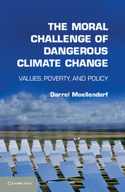 The combination of a recently acquired desktop video magnifier and a kindle has for the time being restored some ease to my reading. Hence this review. I was drawn by the title The Moral Challenge of Dangerous Climate Change: Values, Poverty and Policy, since I can’t see the resistance to energy reform mounted by powerful fossil fuel interests being overcome without some kind of moral determination by a significant portion of the population. I was also attracted by the fact that the author, Darrel Moellendorf is a political and moral philosopher and I was curious to read a philosophical perspective on the climate change issue.
The combination of a recently acquired desktop video magnifier and a kindle has for the time being restored some ease to my reading. Hence this review. I was drawn by the title The Moral Challenge of Dangerous Climate Change: Values, Poverty and Policy, since I can’t see the resistance to energy reform mounted by powerful fossil fuel interests being overcome without some kind of moral determination by a significant portion of the population. I was also attracted by the fact that the author, Darrel Moellendorf is a political and moral philosopher and I was curious to read a philosophical perspective on the climate change issue.
Although the book is intended to be accessible to readers who are not versed in the discipline of philosophy it is no light read. The discussions of the various policy issues it addresses are exhaustive and rigorous. There are no ringing calls, just appeals to humane rationality. But the conclusions are no less compelling for that.
Continue reading “The Moral Challenge of Dangerous Climate Change”

 I’ve often been struck by what I see as parallels between the defence of slavery in earlier times and today’s persistence with fossil fuel-based economies. I explored this in a
I’ve often been struck by what I see as parallels between the defence of slavery in earlier times and today’s persistence with fossil fuel-based economies. I explored this in a  Dealing with global warming is difficult, but it shouldn’t be impossible. What we need to do is well understood. Yet a campaign to prevent and delay emissions reductions, which began in the 1980s almost as soon as science began warning there might be a problem, has been so successful that two decades later it seems that substantive action, the sorts of cuts required to leave us with a planet we can recognise, are impossible to put in place.
Dealing with global warming is difficult, but it shouldn’t be impossible. What we need to do is well understood. Yet a campaign to prevent and delay emissions reductions, which began in the 1980s almost as soon as science began warning there might be a problem, has been so successful that two decades later it seems that substantive action, the sorts of cuts required to leave us with a planet we can recognise, are impossible to put in place.